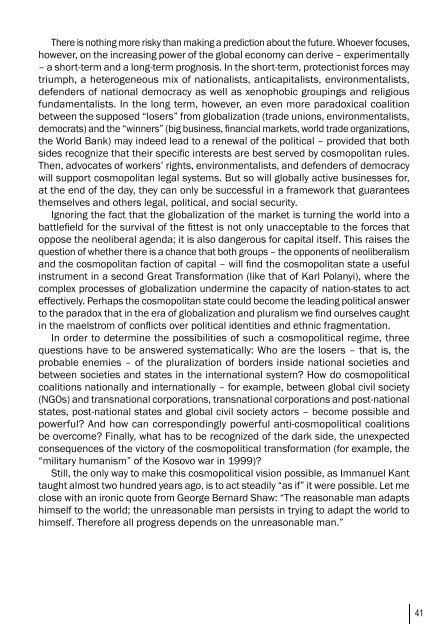art-e-conomy _ reader - marko stamenkovic
art-e-conomy _ reader - marko stamenkovic
art-e-conomy _ reader - marko stamenkovic
You also want an ePaper? Increase the reach of your titles
YUMPU automatically turns print PDFs into web optimized ePapers that Google loves.
There is nothing more risky than making a prediction about the future. Whoever focuses,<br />
however, on the increasing power of the global e<strong>conomy</strong> can derive – experimentally<br />
– a short-term and a long-term prognosis. In the short-term, protectionist forces may<br />
triumph, a heterogeneous mix of nationalists, anticapitalists, environmentalists,<br />
defenders of national democracy as well as xenophobic groupings and religious<br />
fundamentalists. In the long term, however, an even more paradoxical coalition<br />
between the supposed “losers” from globalization (trade unions, environmentalists,<br />
democrats) and the “winners” (big business, financial markets, world trade organizations,<br />
the World Bank) may indeed lead to a renewal of the political – provided that both<br />
sides recognize that their specific interests are best served by cosmopolitan rules.<br />
Then, advocates of workers’ rights, environmentalists, and defenders of democracy<br />
will support cosmopolitan legal systems. But so will globally active businesses for,<br />
at the end of the day, they can only be successful in a framework that guarantees<br />
themselves and others legal, political, and social security.<br />
Ignoring the fact that the globalization of the market is turning the world into a<br />
battlefield for the survival of the fittest is not only unacceptable to the forces that<br />
oppose the neoliberal agenda; it is also dangerous for capital itself. This raises the<br />
question of whether there is a chance that both groups – the opponents of neoliberalism<br />
and the cosmopolitan faction of capital – will find the cosmopolitan state a useful<br />
instrument in a second Great Transformation (like that of Karl Polanyi), where the<br />
complex processes of globalization undermine the capacity of nation-states to act<br />
effectively. Perhaps the cosmopolitan state could become the leading political answer<br />
to the paradox that in the era of globalization and pluralism we find ourselves caught<br />
in the maelstrom of conflicts over political identities and ethnic fragmentation.<br />
In order to determine the possibilities of such a cosmopolitical regime, three<br />
questions have to be answered systematically: Who are the losers – that is, the<br />
probable enemies – of the pluralization of borders inside national societies and<br />
between societies and states in the international system? How do cosmopolitical<br />
coalitions nationally and internationally – for example, between global civil society<br />
(NGOs) and transnational corporations, transnational corporations and post-national<br />
states, post-national states and global civil society actors – become possible and<br />
powerful? And how can correspondingly powerful anti-cosmopolitical coalitions<br />
be overcome? Finally, what has to be recognized of the dark side, the unexpected<br />
consequences of the victory of the cosmopolitical transformation (for example, the<br />
“military humanism” of the Kosovo war in 1999)?<br />
Still, the only way to make this cosmopolitical vision possible, as Immanuel Kant<br />
taught almost two hundred years ago, is to act steadily “as if” it were possible. Let me<br />
close with an ironic quote from George Bernard Shaw: “The reasonable man adapts<br />
himself to the world; the unreasonable man persists in trying to adapt the world to<br />
himself. Therefore all progress depends on the unreasonable man.”<br />
41


